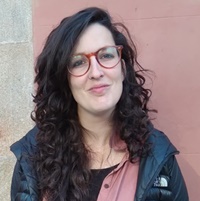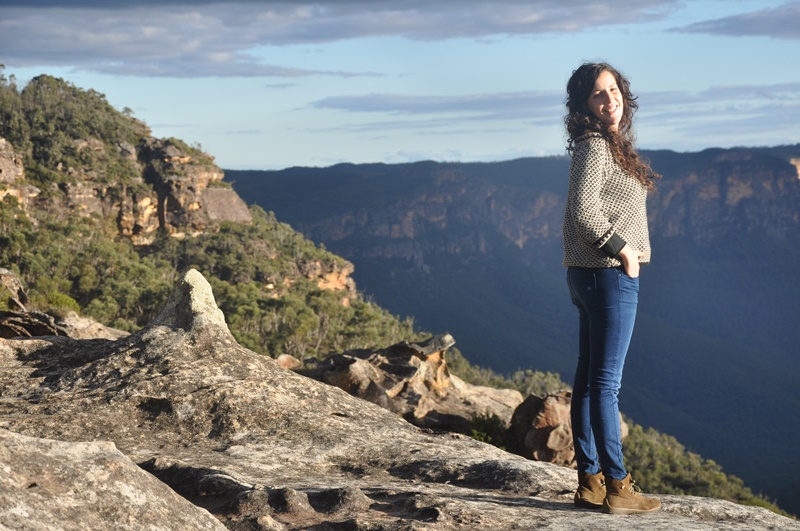Teresa Rosas and the challenge of contributing to a CREAF that embraces diversity and talent
Attracting scientific talent and promoting it, as well as implementing actions to make CREAF a more inclusive and diverse centre, is a challenge. It is so because it opens up a little traveled path and because it inevitably shakes up a way of doing things. This is the task that Teresa Rosas, Talent and gender officer at CREAF for the last two years, has taken on after a couple of years of professional experience managing research and teaching. A few years earlier, she obtained her PhD in terrestrial ecology at the same centre.
Her story speaks of gender inevitably linked to talent and to any age group. "We are often asked to give talks to inspire girls and I ask myself: can't a woman also be a role model for a boy?" The question hangs in the air because of how obvious it is. "We have to go a little further than referents: there is no point in empowering women or other minority groups to pursue a research career, if once they arrive they find a hostile system that expels them. We are putting a lot of focus on women, and perhaps we need to focus on men as allies and on building an academic ecosystem that everyone wants to be part of and feels welcome and valued".

“There is no point in empowering women or other minority groups to pursue a research career if once they arrive they find a hostile system that expels them”
TERESA ROSAS, CREAF Talent & gender officer
She talks about science being driven by a society as complex as the one we are building today. As a game of mirrors, she gives an example in which society and ecosystems come face to face: "As specialists in ecology, we claim the importance of biodiversity to guarantee a resilient ecosystem to face all the challenges posed by global change; but on the other hand, we find it difficult to transfer this to human teams", she points out. "We understand that if a species is located in an ecosystem without favourable conditions, it will eventually disappear. That is why the organisational culture has to ensure that minority groups also feel comfortable and do not encounter obstacles at every step they take".
Gender tightrope walk
The temptation to pot an oasis is great. And I ask her if the ideal would be to reach the point where there is no need for a professional to ensure diversity and inclusion in an organization. The answer is tinged with realism. "I don't think so", Rosas points out with a touch of provocation."It is naive to think that there is a lack of conflict, because it is inherent to people. The ideal situation is that in an organisation we are capable of looking conflict in the face, managing it correctly and repairing it".".
"The ideal situation is an organization in which we are able to look the conflict in the face, manage it correctly and repair it"
The JEDI (Justice, Equality, Diversity and Inclusion) committee, a team that incorporates research, technical and research management staff coordinated by Teresa Rosas, is responsible for the follow-up to put the pieces on the game board and avoid discrimination scenarios at CREAF. "I am very grateful for the voluntary work, the willingness and the good ideas of all the people who are part of the JEDI committee: it is an invisible task that makes the community work". Teamwork, learning, necessity, challenge and cross-cutting themes sprinkles her speech and she insists that there’s a long way, although it is essential to have started it. "One of the novelties of the new plan is to start the way to incorporate intersectionality, so to recognise how different social and cultural conditions - age, gender, class, disability, etc. - interact simultaneously on inequalities and discriminations," she says.
Assessing differently to gain diversity
Hers is one of the voices within CREAF which are calling for a rethink of how scientific careers and research are evaluated, in accordance with the Declaration on Research Assessment (DORA) and the recent Coalition for Advancing Research Assessment (COARA). Both call for taking into account the diversity of activities involved in research, to maximise quality and impact, and coexist with quantitative methods. "It doesn't mean abandoning quantitative indices," she explains, "because they tell part of the story and should be taken into account, but they don't tell the whole story”.
If we want diversity, we have to evaluate differently and go beyond the number of publications. It's a huge challenge, it's not easy and that's probably why it hasn't been done until now, because the numbers a priori seem more objective and easier".
Rethinking the evaluation of science involves taking into account individual but also collective contributions, valuing open science and promoting responsible leadership, for example. "If we want diversity, we need to evaluate differently from how we have done so far and go beyond the number of publications," she eloquently drops. “It's a huge challenge, it's not easy, and that's probably why it hasn't been done until now, because the numbers seem more objective and easier a priori," she admits. The change of procedure involves funding bodies, research centres, people...: "the feeling of changing the game rules once it is started is not pleasant either", she reflects. "It's a slow process, but like any cultural change it takes time, patience and a lot of different minds thinking to find the best solutions”.

The new indicators also take into account the need to diversify professional opportunities, a path that Teresa Rosas knows well. The interest in finding alternatives in academia had always been present during her thesis: "I enjoyed my PhD period very much, I am infinitely grateful to Jordi Martínez Vilalta and Maurizio Mencuccini, my supervisors, but their eyes sparkled in a way that mine didn't when we discussed the results," she explains with a realistic feeling. "Doing a thesis was an intellectual challenge that has always moved me, but I wanted to do some work that would make my eyes sparkle like theirs. That's why I need to stay close to science, but from a position where people have a more relevant role".
A thesis to open doors
"Science is still in my daily life; we all make research possible”
She defends that she is still dedicated to science and that what she has left behind is an academic career. "Science is still in my day-to-day life; we all make research possible," she says. She admits to a certain vertigo at the change of professional career, and that she managed it by contacting colleagues who aroused her curiosity: "I remember contacting Olga Roig, head of the international projects office, and Anabel Sánchez, then a research officer and now head of impact at CREAF. "I wonder what they had done to get to where they were and what exactly they did, because I was attracted to see people doing science from other angles. And now they are two of the people I interact with most at the centre, whose wisdom and generosity I deeply admire and from whom I learn a lot".
"I wanted to do a job that would bring a sparkle to my eyes like the one I saw in those of my PhD supervisors. That's why I need to stay close to science, but from a position where people have a more relevant role"
With the distance, she assures that the doctoral thesis is as useful as a preamble to a research career as it is to face any professional dedication. The reason is that doing a thesis prepares you to look for solutions in unknown areas every day for 4 years."You have to solve questions for which you often have no reference and this opens your mind, trains you to live with uncertainty and provides critical capacity", she recalls. A reality that is in line with her deep conviction that people who do a PhD today have to admit the difficulty of leading a research group. Is this a provocation? I ask her. "No, it's a reality", again clear, precise, unabashed. Science has it built in? I insist... "We turn our backs a bit and, fortunately, the pejorative burden of choosing alternative career paths after a PhD is starting to be removed. It is very important that pre-doctoral staff know how to value the exceptional skills they have acquired during their doctorate. I will never get tired of saying that there are many other equally valid options, which perhaps will even make them enjoy themselves more”.
Enjoying work, that is indeed an oasis and welcome to those who contribute to it.







